



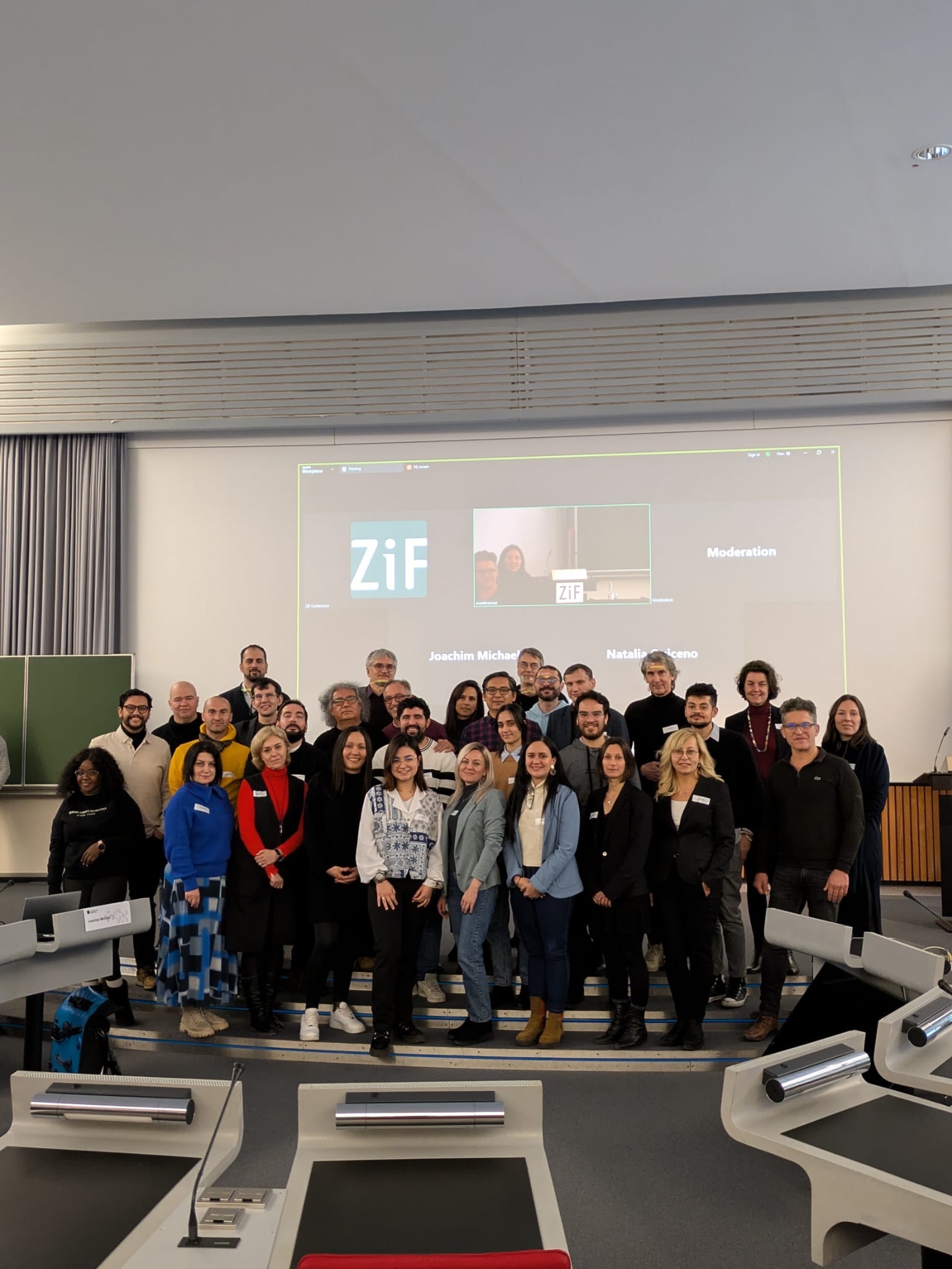
There is a well-established tradition of studying conflict and violence across disciplines such as cultural studies, sociology, literature, discourse analysis, philosophy, and migration studies.This has led to a recurring pattern of inquiry that often positions violence as the primary focus, even within peace studies. As a result, in this paradigm, peace is conceptually dependent on violence. While peace has been defined in various ways, such as the absence of indirect violence (Galtung, 1969), social justice (Zimmerman et al., 2009), a symbiotic relationship with the environment (Conca & Beevers, 2018), or a combination of these three (Standish et al., 2022), this project focuses on "everyday peace." This concept highlights the presence of conflicts within communities but emphasizes the existence of mechanisms that allow for resolving those conflicts without resorting to physical or symbolic violence in daily life.
The project begins with a methodological inversion of traditional assumptions. Rather than starting with forms of violence from which peace emerges, we will focus on the peace proposals offered by people on the move. From these, we will analyze the social, economic, political, and aesthetic conditions that make peace possible. The research program aims to offer a new conceptualization of peace, extending beyond the mere absence of violence, by exploring diverse visions of peace shaped by people on the move.There is currently a lack of research on this specific topic. Our work will address a gap in the existing literature in both peace-conflict studies and migration studies, focusing on the contributions of people on the move to the creation of peace.
The forced movement of people from, through, and to Central America, Colombia, Chile, Germany, Mexico, Spain, and Ukraine will be analyzed. These regions were selected due to their significance in various aspects of forced migration: major receiving areas (Colombia, Germany, and Spain), traditional transit regions (Central America and Mexico en route to the United States), and regions experiencing conflict and high levels of physical violence (Central America, Colombia, Mexico, and Ukraine).
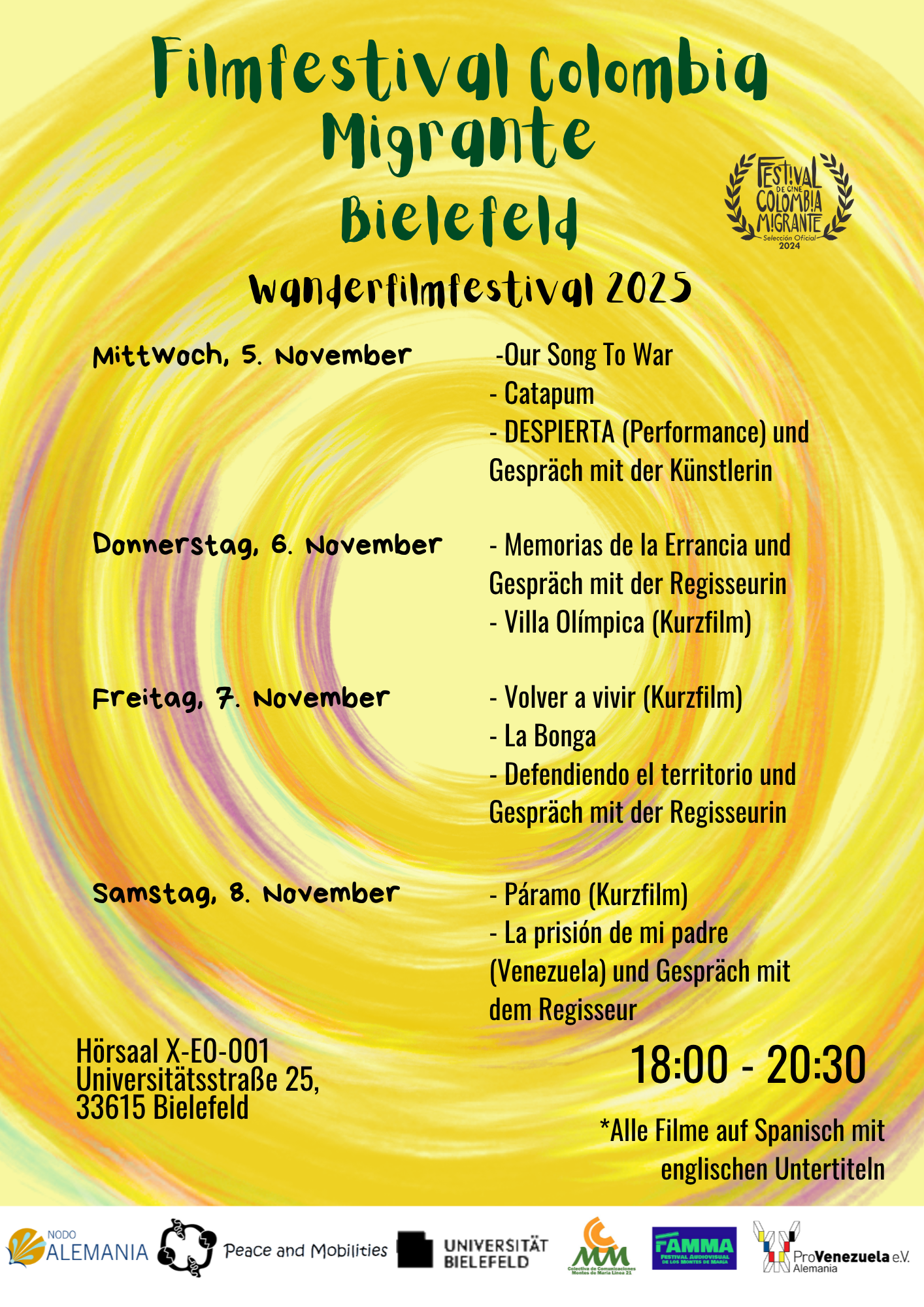
We are pleased to invite you to the Colombia Migrante Film Festival 2025 (Venezuela – Guest Country), which will take place from November 5 to 8 in Room X-E0-001 at the University of Bielefeld, from 6:00 PM to 8:30 PM.
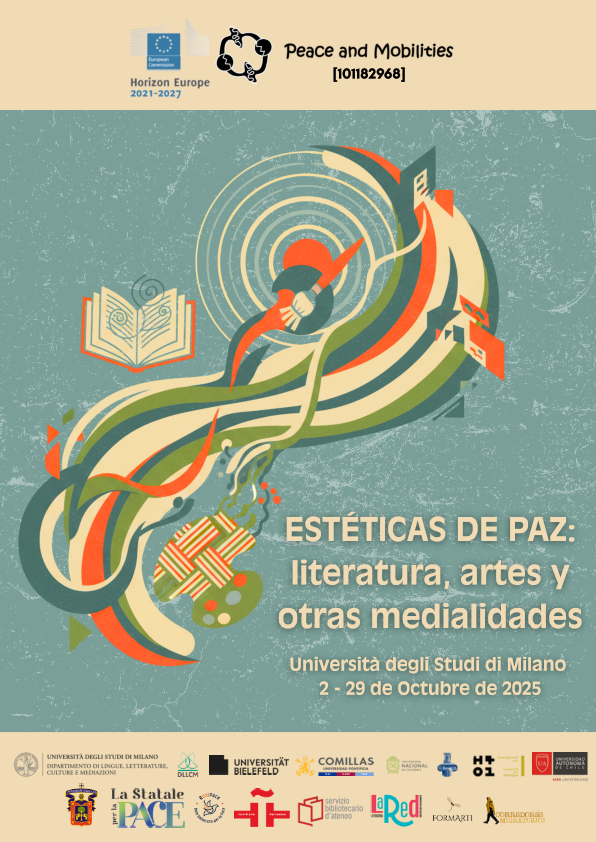
Throughout October, our University will host the international seminar “Aesthetics of Peace: Literature, Art, and Other Media,” organized as part of the HORIZON-MSCA-SE project “Peace and Mobilities.”
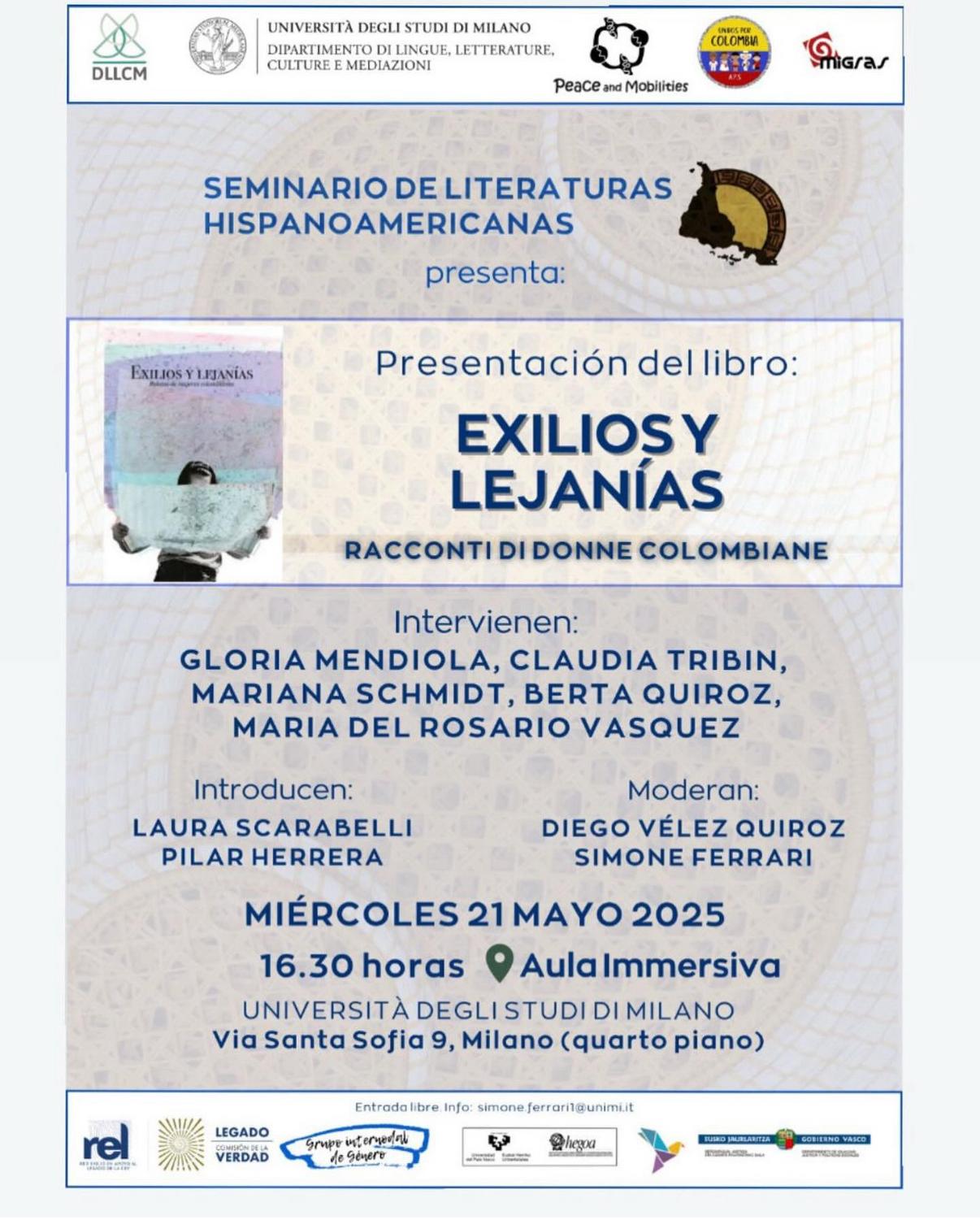
On May 21, the collective book Exilios y Lejanías will be presented at the Università degli Studi di Milano.
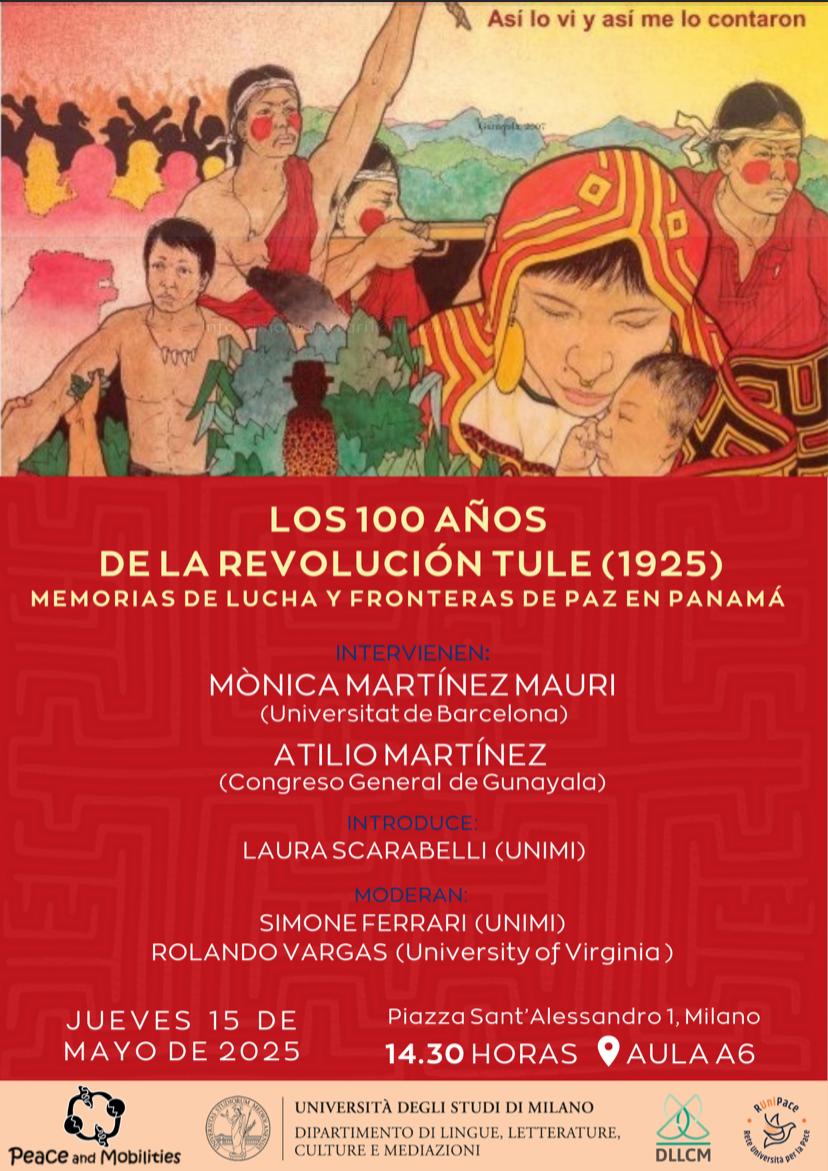
You are cordially invited! Join us for the event: “Los 100 años de la Revolución Tule (1925): Memorias de lucha y fronteras de paz en Panamá” A special commemoration of a century of resistance and cultural identity. When: Thursday, May 15th at 2:30 PM. Where: Room A6. Don’t miss it!
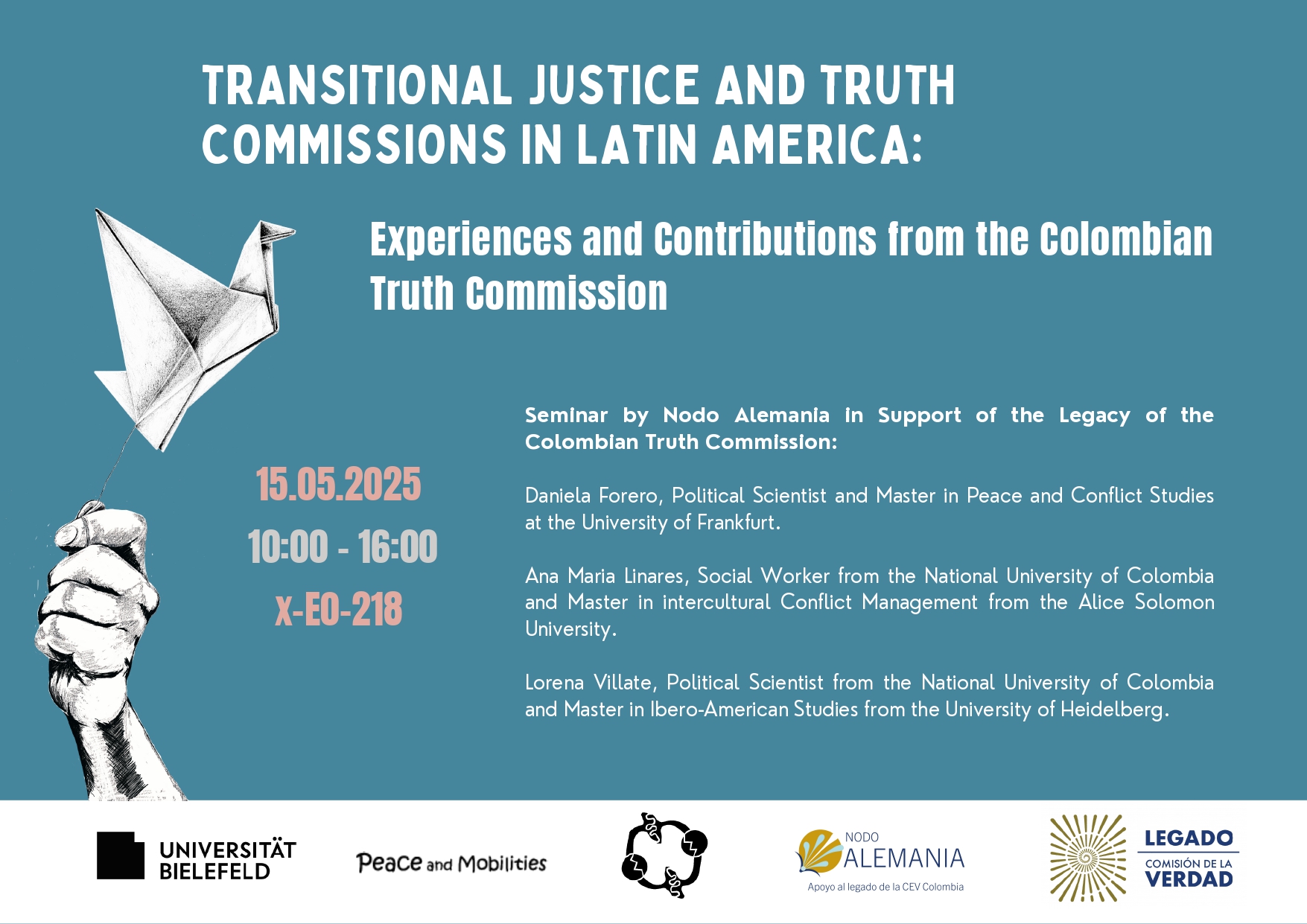
Are you curious about how societies deal with the past? In this Workshop, we will introduce you to the field of transitional justice, with a focus on Latin America. Taking a closer look at Colombia’s Truth Commission, we will explore the challenges it has faced in confronting a violent past and shaping collective memory. Together, we will reflect on the lessons this process may offer for other societies seeking justice and healing in different contexts.
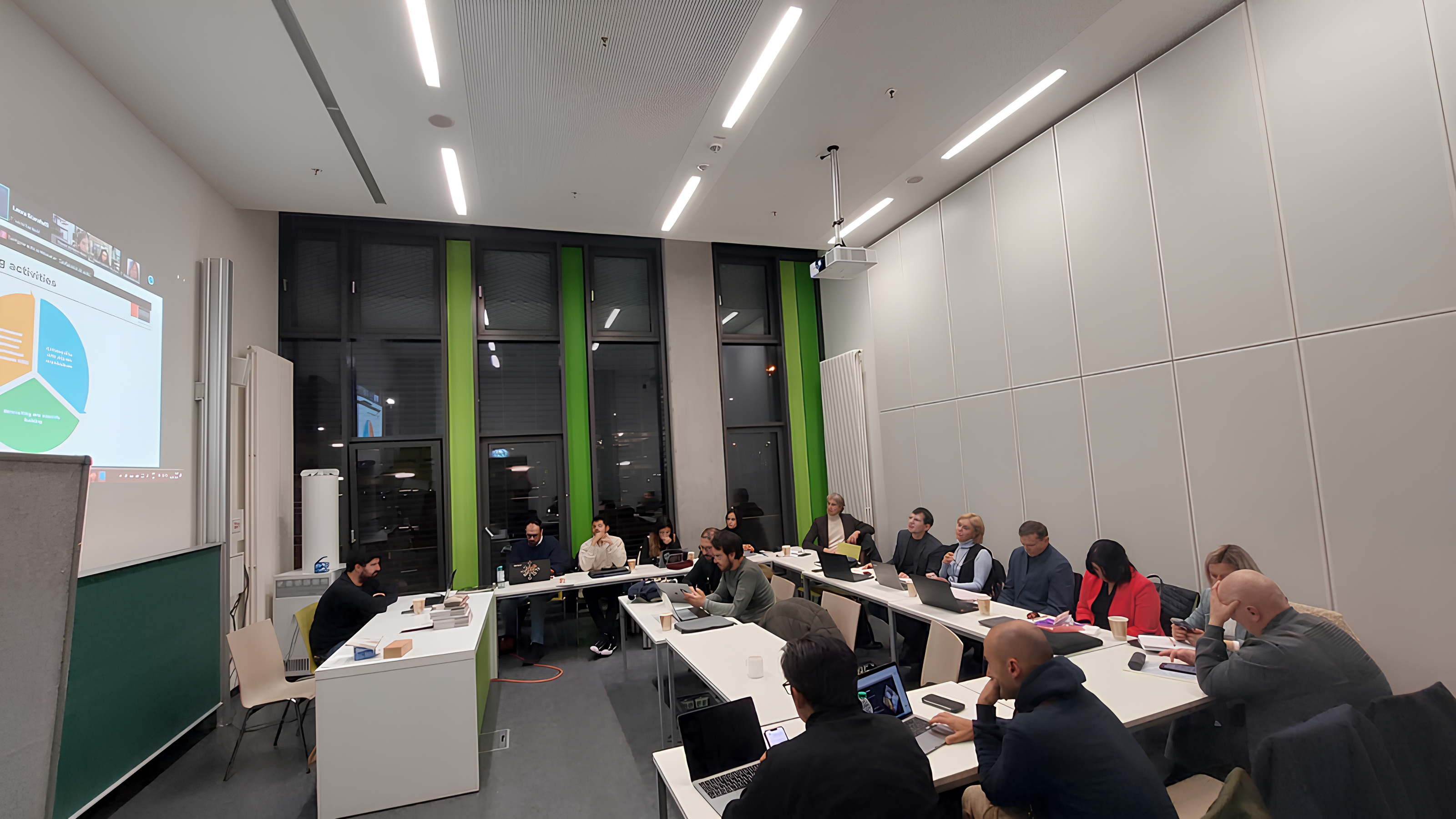
We opened our Workshop in Bielefeld with the business meeting
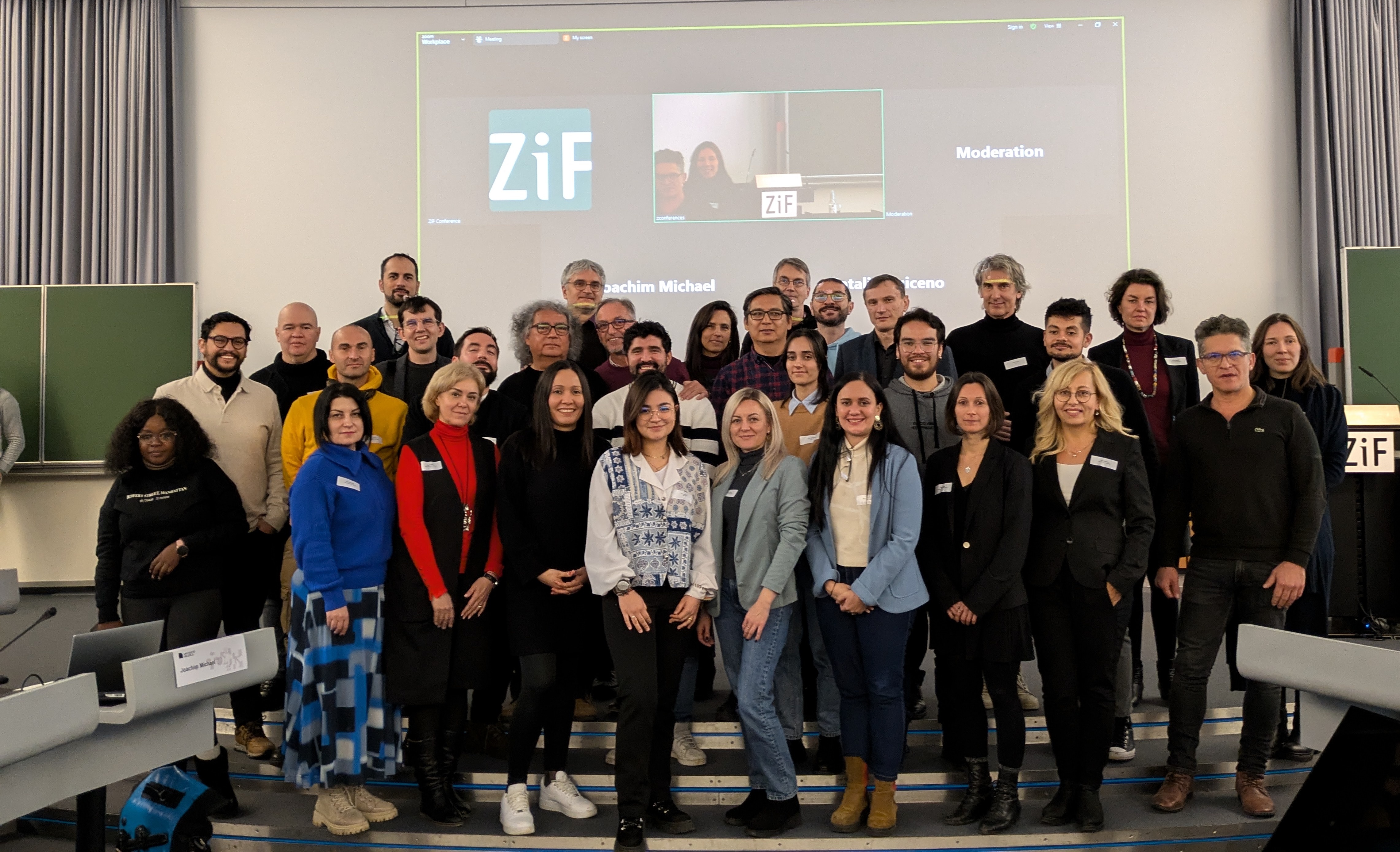
Our Kick-off congress of “Pragmatics of Peace on the Move: Challenging Perspectives on Mobility-Related Conflictivity” provided us the first theoreticahl the first theoretical and methodological approaches for the research of the project.
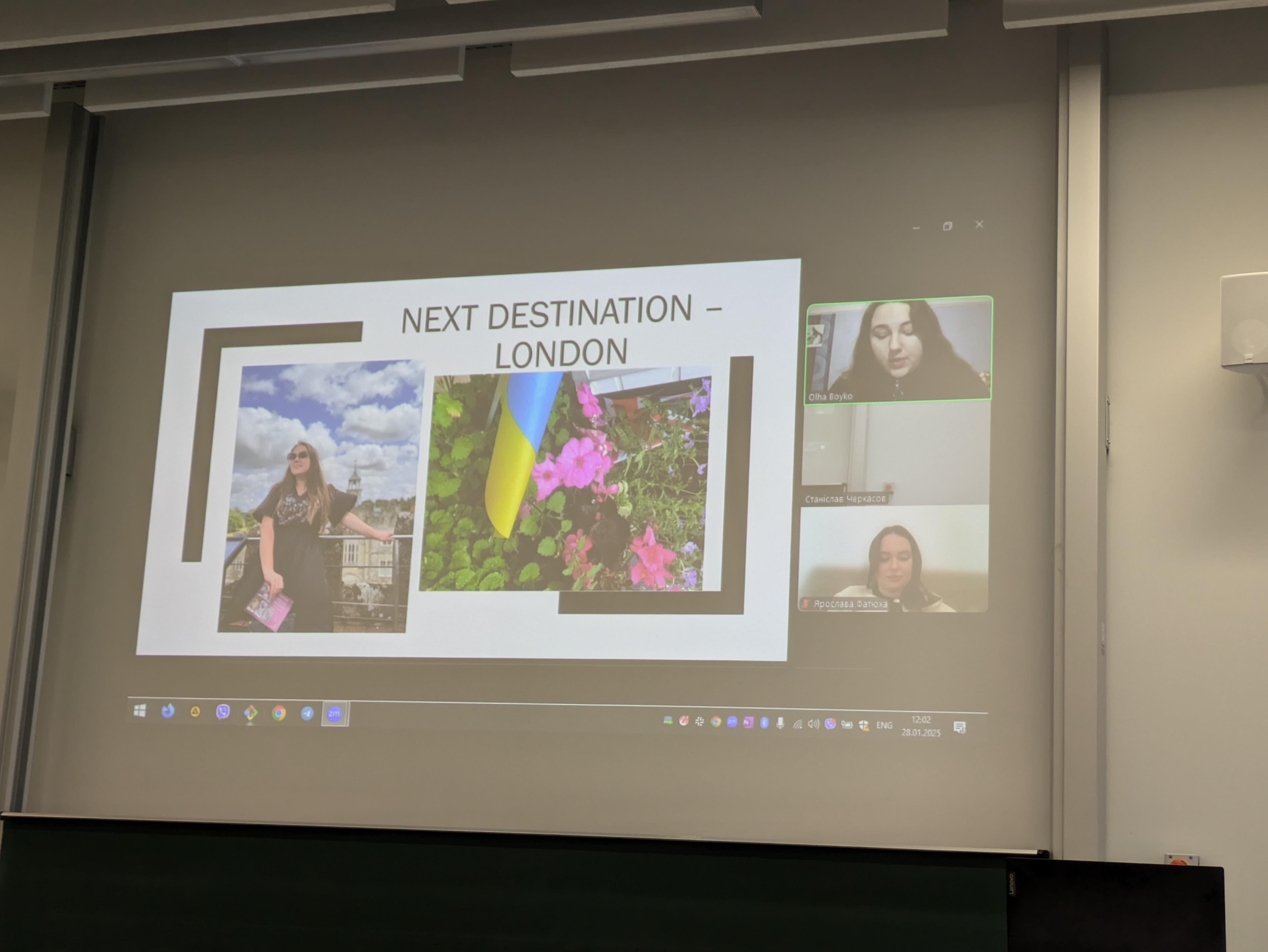
The Ukrainian students, Yaroslava Fatyukh and Olga Boyko, shared their experiences as forced migrants, explained their decision to remain in Zaporizhzhia and how they find peace despite the ongoing war.
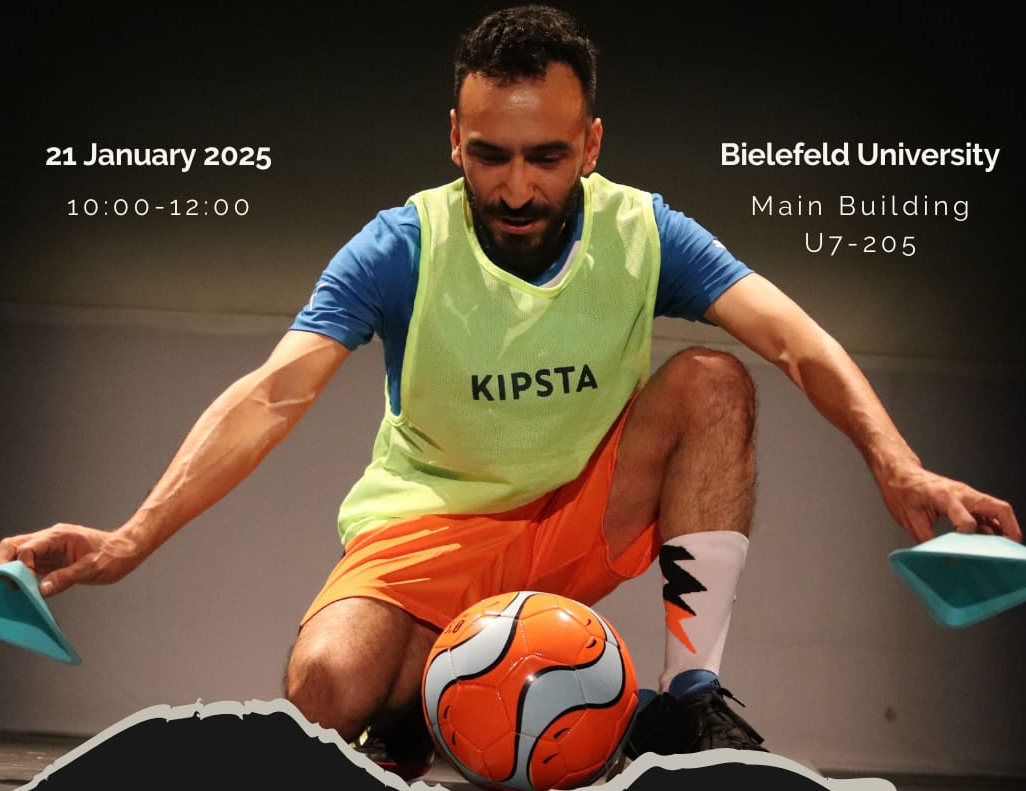
The mexican artist based in Bochum Omar Guadarrama presented his play about migration, football and integration in Germany.
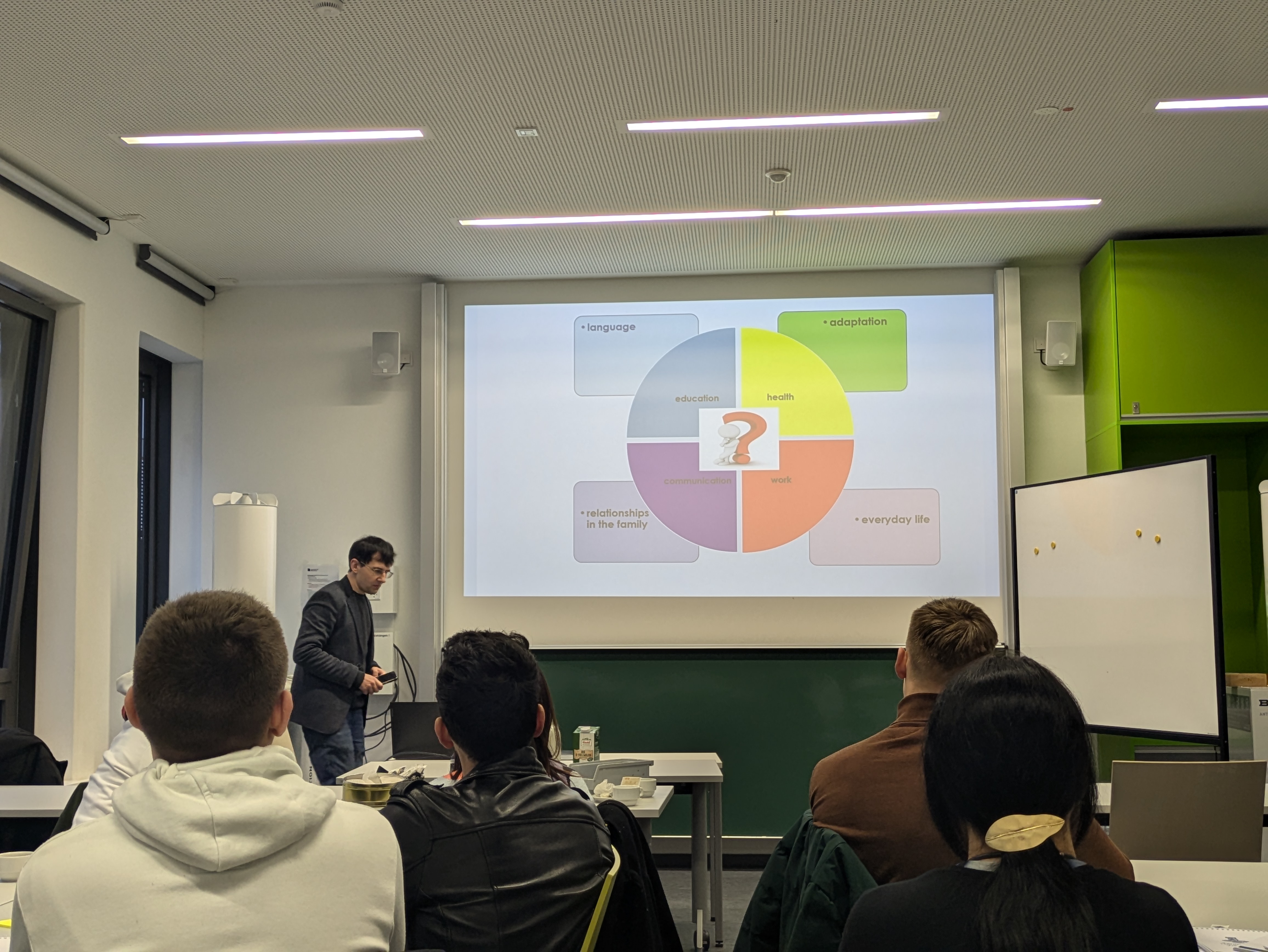
The Zaporizhzhia team demonstrated on-site mental-mapping work with young Ukrainian migrants.
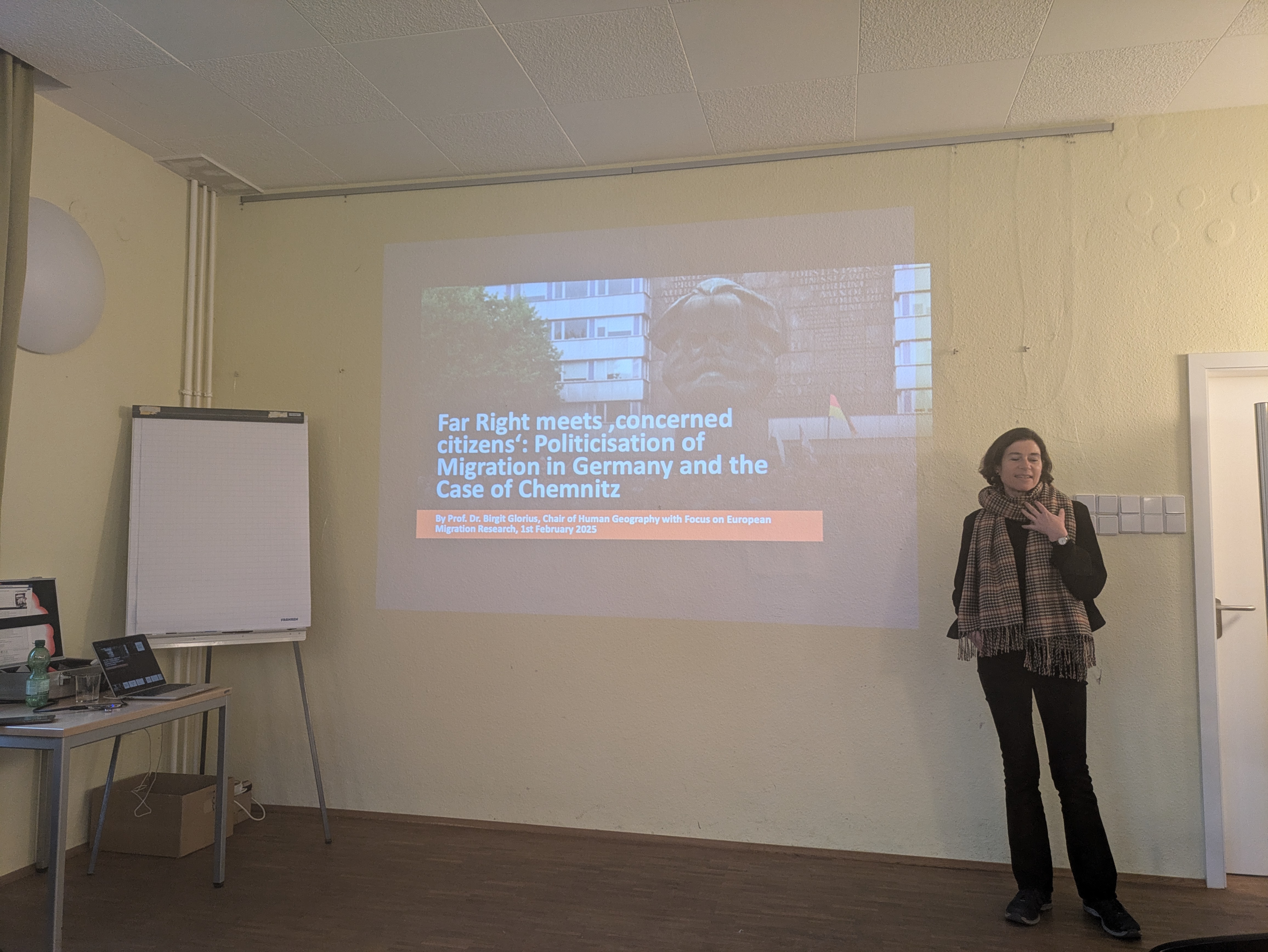
We discussed with Prof. Dr. Birgit Glorius the Far-Right Movements in Chemnitz

Explore our last videos and our video archive

we are well aware of the power of photography. So, we have decided to document our experiences and leave a photographic archive for posterity. Take a look at it.

Because the archives are also sonorous
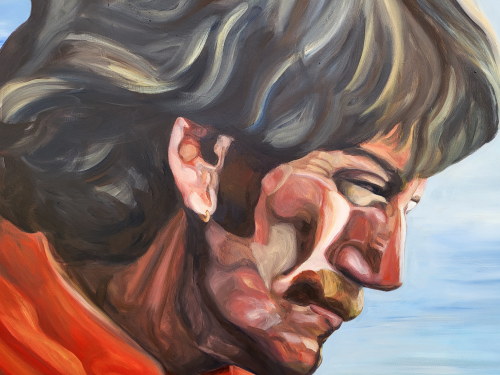
By Jupiterfab
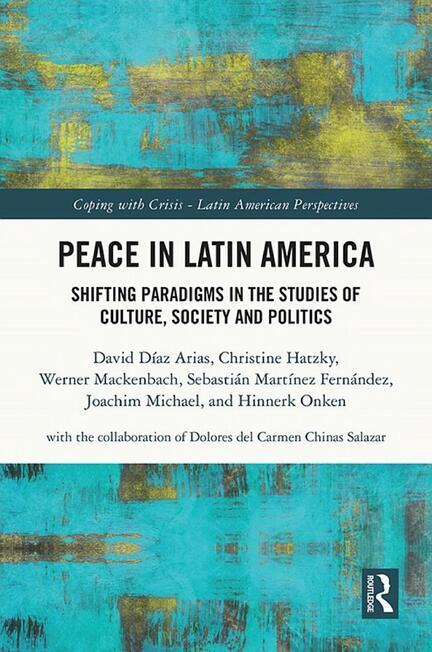
Our colleagues Joachim Michael and Sebastian Martinez, together with other academics from CALAS, present their book “Peace in Latin America: Shifting Paradigms in the Studies of Culture, Society and Politics,” published by Routledge, in which they address the topic of visions of peace in Latin America.
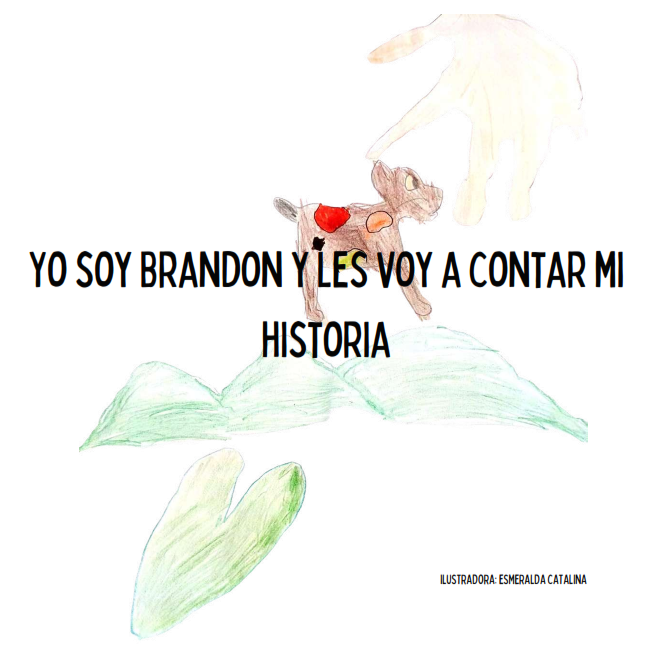
Maria Paulina Arnal recoge las narraciones de 8 niños forzados a migrar. Narran su travesia, sus sueños y sus ahnelos de una vida pacífica.

Our dear collegue Frank Möller describes his experience and his insights of the Kick-off conference in Bielefeld
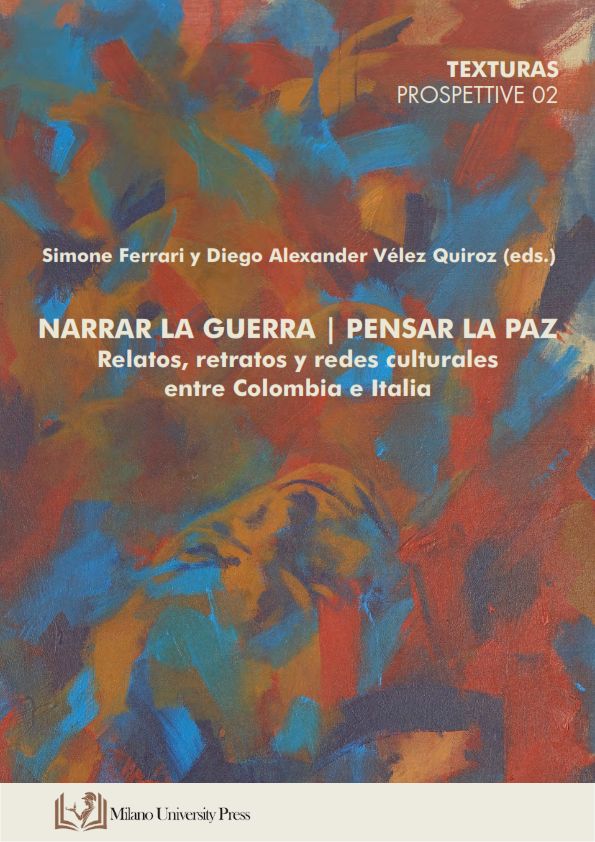
Simone Ferrai and Diego Alexander Vélez Quiroz edited a book which explores the multiple cultural ties between Colombia and Italy from reflecting on key themes of Colombian reality, such as armed conflict, political history, literary production and the complexity of its social fabric.
Peace and Mobilities| Bielefeld University (Coordinator)
Universitätsstraße 25, 33615 Bielefeld | Office M7-129
EMail: coordination@peaceandmobilities.org
As a university internationally regarded for its top-level research and innovative teaching concepts, Bielefeld University makes a significant contribution to a progressive and participatory knowledge society. It is an attractive, family-friendly place to work and study and is characterised by an open communication culture, lived interdisciplinarity, diversity and freedom for personal development. Bielefeld University was founded in 1969 with an explicit research assignment and a mission to provide high-quality research-oriented teaching. With around 24,500 students, the University currently encompasses 14 faculties. As a 'Volluniversität' (full university), it offers a differentiated range of disciplines in the humanities, natural sciences, technology as well as in medicine.
Comillas Pontifical University (Spanish: Universidad Pontificia Comillas) is a private Catholic higher education institution run by the Spanish Province of the Society of Jesus in Madrid, Spain. The university is involved in a number of academic exchange programmes, work practice schemes and international projects with over 200 institutions of higher education in Europe, Latin America, North America and Asia.
The University of Guadalajara (Spanish: Universidad de Guadalajara) is a public research university located in Guadalajara, Mexico. It was originally established in 1586 and officially founded on 12 February 1791 as the Royal and Pontifical University of Guadalajara. Over the centuries, it has evolved into one of Mexico’s leading educational institutions. The university operates multiple high schools, as well as undergraduate and graduate campuses, which are distributed throughout the state of Jalisco. It is widely regarded as the most significant university in the region. Based on its foundation date, it is the second-oldest university in Mexico, the seventeenth-oldest in North America, and the fourteenth-oldest in Latin America.
H401 is a private cultural foundation located in the Herengracht building of the late artist Gisèle d’Ailly van Waterschoot van der Gracht. H401 works in collaboration with local and international institutions, artists, thinkers, scholars and scientists. Academic and artistic research at H401 goes hand in hand with performative and participatory research, through residences, exhibitions, think tanks and publications. For years, H401 has been organizing thematic year programmes exploring actual topics that we all constantly deal with and strive to understand better such as vulnerability to Groupfanaticism, Friendship, Collective Memory and the relation to identity (Memory Machine - We Are What We Remember), Freedom, the Female Perspective and Shame and Masculinity. Through these programmes and its diverse activities, H401 wants to contribute to a more inclusive society by supporting artists, scientists, thinkers, policymakers and intellectuals individuals to make a difference. As a cultural partner within this consortium, H401 will contribute in the form of a number of artists-related activities, such as artist residencies exploring the theme of migration and (every day) peace.
The University of Milan (Università degli Studi di Milano) is one of Italy’s leading public universities, renowned for its academic excellence, interdisciplinary research, and active role in international cooperation. With a strong commitment to global dialogue, the University has increasingly developed collaborative networks across Latin America, especially in the humanities and social sciences.A key focus of these partnerships has been the representation of peace in contexts marked by political violence—a theme of particular relevance in Latin American societies that have experienced decades of conflict, authoritarianism, and democratic transitions. Scholars at the University of Milan engage with Latin American researchers, cultural institutions, and civil society organizations to explore how peace is constructed, narrated, and imagined in post-conflict settings. These collaborations often intersect with fields such as memory studies, literature, political science, anthropology, and media studies. Through joint research projects, academic exchanges, and conferences, the University has contributed to a deeper understanding of how narratives of peace emerge amidst trauma and contested histories. By fostering transnational dialogue, the University of Milan not only supports knowledge production on Latin American experiences but also offers critical insights into global strategies for peacebuilding, justice, and reconciliation in politically volatile environments.
The National University of Colombia (UNAL) is the country’s foremost higher education institution and a regional leader in research, innovation, and social transformation. Founded in 1867, it has grown to become Colombia's largest university, with nine campuses located in Bogotá, Medellín, Manizales, Yopal, and Palmira, extending from the Caribbean to the Amazon, reaching some of the nation’s most remote regions. UNAL is home to 931 research groups, of which 614 are recognised by Colombia’s Ministry of Science, Technology, and Innovation. Its scientific output represents 28% of the national total, establishing it as a leader both nationally and in Latin America. The university offers 94 undergraduate programmes and 329 postgraduate courses, including 54 doctoral programmes, which make up 34% of the national offerings. In the QS Latin American University Rankings, UNAL ranks as the top university in Colombia and among the best in Latin America. UNAL's mission is to contribute to national unity as a centre of intellectual and cultural life, open to all currents of thought and to diverse social, ethnic, regional, and local sectors. It is also dedicated to studying and enriching the nation’s cultural, natural, and environmental heritage, as well as contributing to its preservation. With a vision for 2034, UNAL aims to be Colombia's leading university, recognised for its contributions to the nation and its excellence in teaching, research, social innovation, and technological development. With a strong commitment to peacebuilding, UNAL strives to generate and share knowledge of scientific and cultural importance.
Detalles del Partner 7...
Zaporizhzhia National University (ZNU) is one of the Ukrainian’s foremost higher education institutions and a regional leader in research, innovation, and social transformation. ZNU ranked top positions among Ukrainian universities in the edition of the Webometrics Ranking of World's Universities. As an integral part of Zaporizhzhia National University, Faculty of History and International Relations is an interdisciplinary research centre, recognised for its contributions to the nation and its excellence in teaching, research, social innovation, and scientific development. The Faculty is a distinguished national center in Ukraine, serving as a hub for European integration in the South of the country and for the promotion of European science and research projects supported by the European Union. It is also a key institution for the development of history and humanities textbooks in Ukraine and a powerful driver of European integration. The Faculty was among the first in Ukraine to actively respond to the full-scale Russian war against Ukraine with research initiatives. As part of a frontline city, it has direct access to documenting primary sources of the war and conducting interviews with combatants and civilians. The Faculty’s research foundation is built upon a strong academic team specializing in cultural-historical anthropology, advancing innovative studies in the field. Faculty’s mission is to contribute to national unity as a centre of intellectual and cultural life, strengthening Ukraine’s resilience, and overall resistance to the aggressor, advancing the frontiers of European science, open to all currents of thought and to diverse social, ethnic, regional, and local sectors. It is also dedicated to studying and enriching the nation’s cultural, natural, and environmental heritage, as well as contributing to its preservation. With a strong commitment to peacebuilding, Faculty strives to generate and share knowledge of scientific and cultural importance.
Peace and Mobilities focuses on investigating the conditions that make the existence of peace aesthetics possible. However, the project's aim is not only to explore these conditions but also to promote them. To achieve this, we collaborate closely with various artists who bring these creations to life through murals, engraving, literature, music, and other forms of art.
He is a philosopher from the Universidad Nacional de Colombia. He received his PhD from the University of Bielefeld with the best thesis of the faculty. He is currently a lecturer and researcher at the University of Bielefeld. He is also the PI of the EU-funded project “Peace and Mobilities”. He is a member of the Colombian Discourse Analysis Group and the Colombian Philosophy of Technology Group. He is also a researcher of the Speme memory spaces project and the scientific Colombia: post-conflict ecosystem project. His publications include, among others: Lógicas mediales y narrativas: transmedialización de las narrativas sobre el narcotráfico en Colombia, Film and Memory: The Role of Footage and New Worlds from the Cinema in the Construction of Human Memory, Imaginaries of the Americas: paradox about the production of reality through fiction, Historicidad del tiempo en los pensadores latinoamericanos: tempus de enunciación”.
He is a full professor for InterAmerican Studies and Romance Studies at the University of Bielefeld, Germany, since April 2014. He has been a visiting Professor at the Texas A&M International University, in Laredo, Texas, USA, and at the University of Guadalajara, Mexico. He did his post-doctorate (Habilitation) in Romance Studies at the University of Hamburg, “Petrified History: Apocalypse and Literature in Mexico”. He received his doctorate in Romance Studies at the University of Freiburg (magna cum laude) with the dissertation: “Television and Cultural Rupture: Telenovelas in Latin America”. Joachim Michael is founding member of the Center for Advanced Latin American Studies - CALAS and has been a member of the steering committee until July 2019. Furthermore, he is co-coordinator of the Laboratory of Knowlodge "Visions of Peace. Transitions between Violence and Peace in Latin America."
She is a Doctoral candidate in Sociology at Bielefeld University, Germany. She holds a master's degree in Inter-American Studies from the same institution, where she also teaches on forced migration in the Americas at the Faculty of Sociology. Trompetero has worked as a researcher on forced displacement at the Migration Policy Institute and as a consultant for UNHCR and the Inter-American Development Bank with Equilibrium SDC. She has also been a visiting researcher at the German Institute of Development and Sustainability (IDOS). Her research areas focus on forced migration studies, migration policies from an institutional sociology perspective, and the categorization processes of people on the move. María Gabriela Trompetero has also worked with organizations led by refugees and migrants in Latin America, the Caribbean, and Germany. Additionally, she has collaborated with various international media outlets to contribute to knowledge transfer, including BBC, Deutsche Welle (DW), El País, El Espectador, El Tiempo, Voice of America, La Silla Vacía, among others.
Cecilia Estrada Villaseñor, expert in migration, refugee issues, and human rights, with an extensive background in research, consultancy, and communication. She currently serves as the Director of the Chair of Refugees and Forced Migrants - INDITEX and as the Coordinator of the Ibero-American Observatory on Human Mobility, Migration, and Development (OBIMID), where she leads research on human mobility in the Ibero-American region. Since 2018, she has been a human rights expert for the Spanish team of the FRANET project (European Commission), contributing to data collection and analysis on fundamental rights issues, including asylum, borders, migration, non-discrimination, minors, data protection, and victims’ access to justice. She has also served as a jury member for prestigious human rights, cooperation, and migration awards, such as ARISTOS Campus Mundus and the Padre Arrupe Human Rights Award. She holds a PhD in International Migration and Development Cooperation from Comillas Pontifical University, a Master’s degree in International Relations and Communication from the Complutense University of Madrid, and a Bachelor’s degree in Communication Sciences from the Universidad Autónoma de Guadalajara. Her academic background is complemented by specialized studies in journalism at the Universidad de Belgrano in Buenos Aires, as well as her experience as an editor for the magazine NEXOS.
Trained in International Development Cooperation at the Universidad Pontificia Comillas and graduated in Law at the Universidad Complutense de Madrid. She began her professional career in the world of international cooperation with the Fundación Jóvenes y Desarrollo in Madrid as an assistant in educational projects for young people in French-speaking Africa. As a project technician she has worked during 2018 and 2019 at the Don Bosco Foundation in Cambodia, where she implemented self-sustainable programmes for the socio-economic development of the local community of Sihanoukville, through vocational training for young people. For the last two years 2020-2022, she worked for the Jesuit Refugee Service in Greece on social inclusion and integration projects, accompanying asylum seekers, refugees and migrants from their arrival in Europe to their full participation in the host societies. She also worked for the organisation Strong Gens, in charge of two first reception houses for the Afghan population in Athens. She is currently a trainee researcher at the Chair on Refugees and Forced Migrants and collaborated in the Data Culture project for the application of a statistical model Multiple Systems Estimation (MSE) in the collection of data for the identification of victims of trafficking in Spain, as well as the FAIR Project : “EU Charter of Fundamental rights: Awareness raising and Instruments to promote a culture of Rights”.
Isabel graduated in Sociology, International Relations, and Development Cooperation Development from the Complutense University of Madrid, with a Master’s in International Security from the Barcelona Institute of International Studies. She has actively participated in development and international cooperation projects, notably working with the Red Cross as a Spanish teacher for refugees. Additionally, she is a project manager and designer at OAN International (in Nikki, Benin), where she focuses specifically on women's access to microcredits and job opportunities that enable their economic independence. Moreover, together with the Beninese team, they are implementing a waste disposal and recycling system to ensure a healthy community. As part of her commitment to social justice, she volunteers with Cáritas to support people at risk of social exclusion. She is currently a research trainee at the Chair of Refugees and Forced Migrants and collaborates on the CERV EMPOWER YOUTH project, which aims to combat racism, Islamophobia, and all forms of discrimination by creating awareness and co-creation spaces with Muslim youth and/or those perceived as such.
Ana is a PhD candidate at the Chair on Refugees and Forced Migrants (Universidad Pontificia de Comillas) and a member of the working team of the CHARMES project: Honest Communication on Refugees and Migrants in social media and public opinion: PID2023-146852OA-I00. Graduated in International Studies from the Universidad Autónoma de Madrid, she holds a Master's degree in International Relations and African Studies from the same institution. Member of the editorial team of the academic journal “Relaciones Internacionales”, she coordinates the Evaluation Committee since 2022. Previously, she has carried out a research stay at the University of Suleimaniya (Iraqi Kurdistan Region), where she addressed the process of female social mobilization that has taken place in the region during the last thirty years. In addition, she has been a research assistant at EsadeGeo (Esade's Center for Global Economy and Geopolitics), and has done internships at the Ministry of Foreign Affairs and European Union, the Ibero-American General Secretariat (SEGIB), the Iraqi Kurdistan Regional Government Representation office in Spain, as well as in the research project “From liberal peace to military peace? An analysis of contemporary changes in peacebuilding.
Frans studied Business Administration at the University of Groningen and Publishing in Amsterdam. He worked for many years, e.g. at Reed Elsevier and VNU Business Publications. In 2008, he was appointed head of Business Operations at the National History Museum (NHM), until this ambitious project was abruptly terminated by the government in 2011 after a heated debate in the media and politics about historical representation, the national canon, collective identity and cuts in the cultural sector. Frans has now been working for the H401 foundation for over 12 years, as co-director for a few years now. This former hiding place during the Second World War and private artists‘ home in the 1950s - 1980s, has been running a public programme since 2008 that focuses on the innovative handling of (’contested') heritage. It does so in residencies and both local and international collaborative projects.
Micol is the Project Coordinator at Stichting H401 (H401). She is a graduate of the Research Master in Cultural Leadership at the University of Groningen (NL). Her research background lies in (Russian) memory studies and memory artivism.
Michael is co-director of the cultural foundation Herengracht 401. Under his leadership, the former publishing house Castrum Peregrini transformed into a cultural centre focused on freedom, culture, and friendship. He redeveloped its real estate and improved access to its cultural heritage. Defuster has curated exhibitions, theatre productions, and lectures exploring the foundation’s WWII history, driven by the central question: Why were innocent people forced into hiding? His work examines themes such as fanaticism, friendship, the paradoxes of freedom, and cultural memory. Trained as an architect, he has worked with Dutch architectural firms and the Urban Development Department of Amsterdam. From 1998 to 2008, he has edited the German-language cultural magazine Castrum Peregrini. Currently, he is establishing a new cultural space in Athens.
Neyla holds a PhD in Hispanic Linguistics from UNED (Spain) and is a Full Professor in the Department of Linguistics at the National University of Colombia, as well as a researcher at the Institute of Studies in Communication and Culture (IECO). She leads the Colombian Group for Media Discourse Analysis and is an Emeritus Researcher at the Ministry of Science, Technology and Innovation and the National University of Colombia. Her research focuses on Multimodal and Multimedia Critical Discourse Studies (MMCDS), and she has been part of international networks such as SPEME, FELS, ALED, REDLAD, REDLEM, and IASS-AIS. She is currently the lead for the Colombian team in the Peace and Mobilities project.
Camilo is a philologist and linguist with postgraduate studies in linguistics from the National University of Colombia. A member of the Colombian Group for Media Discourse Analysis for the past eight years, he currently serves on the board of the Latin American Federation of Semiotics (FELS). His research focuses on media narratives surrounding structural inequalities in highly vulnerable contexts linked to armed conflict. His publications have addressed key issues for peacebuilding in Colombia, including collective memory and the representation of conflict victims. He is currently exploring the relationship between territorial construction processes and forced mobility in Colombia.
She is a political scientist from the National University of Colombia with postgraduate studies in Ibero-American Studies from Heidelberg University. She is currently a researcher at the National Observatory of Memory Processes (ONALME) and the Colombian Group for Media Discourse Analysis, both at the National University of Colombia. Her research interests include migration literature, as well as the memories and poetics of exile among Colombian women in Europe. She has been part of the international research project SPEME and is an active member of the Germany Node, an initiative supporting the work of Colombia’s Truth Commission. Her publications have explored collective memory construction in media contexts and the representation of victims of the Colombian armed conflict.
Leandro is a sociologist with three Master's degree in Community Development, Gender, and Development Studies. He is currently pursuing a PhD in Development Studies at the International Institute of Social Studies (The Hague) and the University of Los Andes, and is a member of the Colombian Group for Media Discourse Analysis at the National University of Colombia. His research examines how memory initiatives led by LGBTQ+ social organisations contribute to social change within the framework of transitional justice. His approach integrates participatory action research, dialogical methods, popular education, and queer and feminist methodologies. He has worked with international development agencies, advised human rights organisations, and held positions in Colombian institutions responsible for victim reparation and historical memory.
Daniel holds a degree in Literary Studies from the National University of Colombia and has postgraduate studies in Interdisciplinary Latin American Studies from the Freie Universität Berlin. He is currently a researcher with the Colombian Group for Media Discourse Analysis at the National University of Colombia and a cultural disseminator with a particular interest in Latin American poetry and narrative, especially works addressing state violence, inequality, and ecological catastrophe. His research focuses on contemporary Colombian poetry and its hybridity with visual and performative arts. Additionally, he works as a cultural journalist and disseminator for Festival Barrio (Bairro) Berlin, an annual congress of Latin American writers held in the German capital.
Luis is a journalist from the University of Antioquia, holds a Master’s in Communication and Media from the National University of Colombia, and a PhD in Communication, Languages, and Information from Pontificia Universidad Javeriana. He has been a researcher with the Colombian Group for Media Discourse Analysis at the National University of Colombia for ten years. His work focuses on Indigenous video and communication as a tool to enhance the expressive capacities of ethnic communities in Colombia and contribute to everyday peacebuilding. He has participated in peace education projects, including La Paz en Foco, a television programme by the National University of Colombia. Additionally, he has experience in advising and implementing projects in communication, language, and media analysis.
Serhat holds a PhD in Human and Social Sciences from the National University of Colombia, where his research focused on state violence in Colombia. He earned a Master’s in Political Science from Ankara University with a thesis on utopianism and Latin American liberation theology. Currently, he is a researcher with the Colombian Group for Media Discourse Analysis at the National University of Colombia and a postdoctoral researcher funded by Mexico’s National Council for Humanities, Science, and Technology (Conacyt). His publications address political violence, racism, dehumanisation, forced displacement, and exploitation in West Asia and Latin America. He is a 2024–2025 Summer Programme Fellow in Social Sciences at the Institute for Advanced Study (IAS) and a Mellon/SAR Academic Freedom Fellow (2024–2025) with the project Organised Crime and Academic Freedom in Mexico. Additionally, he serves as Chair of the Outreach and Partnerships Committee at the Global Internet Governance Academic Network (GigaNet).
Edna is a doctoral candidate in a cotutelle programme between Friedrich-Alexander-Universität Erlangen-Nürnberg (FAU) and the National University of Colombia. She is a researcher with the Colombian Group for Media Discourse Analysis, with an academic and professional trajectory spanning armed conflict, migration, and environmental issues. A former Friedrich-Ebert Foundation scholar, she has worked in Colombia, Ecuador, Brazil, and Germany on human rights and environmental justice. Since 2019, she has documented interviews for Colombia’s Truth Commission and collaborated with its Support Node in Germany. Additionally, she coordinated and moderated Sin Fronteras, a radio programme led by the Latin American diaspora in Germany, focusing on politics and human rights in Latin America. In 2018, she was awarded the DAAD Prize at FAU for academic excellence and social commitment.
Fernanda Barbosa is a journalist and historian, as well as a researcher with the Colombian Group for Media Discourse Analysis at the National University of Colombia. She works for Rutas del Conflicto, a Colombian media outlet, focusing primarily on investigative and data journalism related to conflict and peace in Colombia. She is currently a doctoral candidate in Human and Social Sciences at the National University of Colombia, in cotutelle with the University of São Paulo (Brazil). She has worked as a consultant for Colombia’s Truth Commission, a university lecturer, and a reporter for various news agencies. Her research interests lie at the intersection of journalism, memory work, and the public uses of history, particularly through collaborative methodologies and storytelling.
Juan holds a degree in Political Science from the National University of Colombia and has postgraduate studies in Social Policies from the University of Buenos Aires. He has been a researcher with the Colombian Group for Media Discourse Analysis at the National University of Colombia for fifteen years. His work focuses on peacebuilding, transitional justice, human rights, and development. He has participated in research projects funded by international institutions, research networks, development agencies, and multilateral organisations. With experience in highly complex contexts, he has contributed to designing strategies for violence reduction, governance strengthening, and sustainable peacebuilding in settings affected by mobility and forced displacement. His research examines how development dynamics and the reconfiguration of governance frameworks in Colombia’s transitional context influence mobility processes and sustainable peacebuilding.
Fabrizio is an Italian multimedia artist working on social issues and supporting communities using art and scientific tools. I am based in Mexico but work worldwide. My goals are to inspire reflection, encourage dialogue, and drive meaningful transformations in contemporary society. My 3 main topics are migration, water issues, and digital technology abuse. My main media are murals in public spaces and paintings in exhibits. I blend realism with expressionism, sometimes exaggerating and distorting figures to unveil emotions, vulnerabilities, and hidden narratives. Each piece is an invitation to reflect on the real person behind the mask. To name some of the institutions I am currently working or have worked with: the Italian Government, Tijuana Triennial, Rotterdam Court of Justice, Indian Institute of Technology of Bombay, Mexico’s National Center for the Arts, Barcelona Subway Company, UNHCR, RMIT of Melbourne, Center for Contemporary Arts Can Felipa, GIZ Mexico, Vanderbilt University, the University of Toronto, etc.
Interdisciplinary scenic creator with bachelor's degree in Communication (Universidad Nacional Autónoma de México); in Acting (Instituto Nacional de Bellas Artes y Literatura). He is a Master's student in Inter-American Studies at the University of Bielefeld, Germany. He has dedicated his work to research and artistic reflection on the contemporary scene between memory, migration and technology through interdisciplinary languages and performance. He has presented his work in several cities in Mexico, as well as in China, Colombia, Argentina, Romania, Italy, Canada, Brazil, Spain and Germany. He was selected as Interdisciplinary Scenic Creator by the Ministry of Culture in Mexico through the System of Support for Creation and Cultural Projects (2023) which allowed him to conclude his long term interdisciplinary project called Trilogy of Memory with the third performance: REC/PAUSE: Journeys of memory.
Camilo Forero is a philosopher from the Universidad Nacional de Colombia. He received his PhD from the University of Bielefeld with the best thesis of the faculty. He is currently a lecturer and researcher at the University of Bielefeld. He is also the PI of the EU-funded project “Peace and Mobilities”. He is a member of the Colombian Discourse Analysis Group and the Colombian Philosophy of Technology Group. He is also a researcher of the Speme memory spaces project and the scientific Colombia: post-conflict ecosystem project. His publications include, among others: Lógicas mediales y narrativas: transmedialización de las narrativas sobre el narcotráfico en Colombia, Film and Memory: The Role of Footage and New Worlds from the Cinema in the Construction of Human Memory, Imaginaries of the Americas: paradox about the production of reality through fiction, Historicidad del tiempo en los pensadores latinoamericanos: tempus de enunciación”.
He holds a PhD in History and is an Associate Professor, Head of the Department of World History and International Relations at Zaporizhzhia National University. His research focuses on humanitarian issues in world politics, European think tanks, advised human rights organizations with a particular interest in cultural anthropology, everyday peace building and peace studies methodology. Additionally, he has experience in coordinating and implementing peace education projects as well as projects in social values and identity, European history and culture, media analysis including «On the other side of the Dnieper: the impact of controversial images of the «other Ukrainian» in the formation of mental borders» (Federal Assistance Award of the U.S. Department of State); project «Propaganda in the Modern Media Space» (Federal Assistance Award of the U.S. Department of State) and «Representing People on the Move» (Durham University, Great Britain). He is the lead coordinator for the Ukrainian team in the Peace and Mobilities project.
He is a Historian, Cultural Anthropologist, Associate Professor, Head of the Department of Source Studies and Social Communications at Zaporizhzhia National University. His research is related to cultural anthropology, with a particular focus on oral history interview methods aimed at documenting and studying the history of the Russian-Ukrainian war in highly vulnerable contexts linked to armed conflict. Additionally he specializes in research in the fields of Source Studies and Historical Heritage Studies. Researcher in peace education projects including «On the other side of the Dnieper: the impact of controversial images of the «other Ukrainian» in the formation of mental borders» (Federal Assistance Award of the U.S. Department of State) and «Representing People on the Move» (Durham University, Great Britain).
She is a Historian and Psychologist, Dean of the Faculty of History and International Relations, Associate Professor of the Department of World History and International Relations at Zaporizhzhia National University. Her research focuses on cultural anthropology, European historical memory policies and their implementation for peacebuilding in Ukrainian society. Her publications have addressed key issues for peacebuilding in Ukraine, including collective memory and identity, peace visions representations. Leading researcher in peace education projects including «On the other side of the Dnieper: the impact of controversial images of the «other Ukrainian» in the formation of mental borders» (Federal Assistance Award of the U.S. Department of State); project «Propaganda in the Modern Media Space» (Federal Assistance Award of the U.S. Department of State); «Multidisciplinary Approaches to Developing Research Capacity and Resilience through Partnerships in Conflict» (Durham University, Great Britain).
He is a Historian, Cultural Anthropologist, Professor, of the Department of Source Studies and Social Communications at Zaporizhzhia National University. His research is related to Source Studies particularly through collaborative methodologies and storytelling. His work focuses on oral history as a tool to examine the everyday peace culture of ethnic communities in Southern Ukraine and contribute to everyday peacebuilding. Researcher in peace education projects including «On the other side of the Dnieper: the impact of controversial images of the «other Ukrainian» in the formation of mental borders» (Federal Assistance Award of the U.S. Department of State) and «Representing People on the Move» (Durham University, Great Britain).
She holds PhD in History, she is a Senior Lecturer at the Department of Modern History of Ukraine at the Faculty of History and International Relations. Her research is related to cultural anthropology, with a particular focus on oral history interview methods aimed at documenting and studying the history of the Russian-Ukrainian war in highly vulnerable contexts linked to armed conflict. Primary research areas include collective memory and the relationship between Art and Peace. Researcher in peace education projects including «Multidisciplinary Approaches to Developing Research Capacity and Resilience through Partnerships in Conflict» (Durham University, Great Britain).
She is a Historian, Cultural Anthropologist, Associate Professor of the Department of World History and International Relations at Zaporizhzhia National University. Her research focuses on peacebuilding, peace visions representations, human rights and development. Researcher in peace education projects including «On the other side of the Dnieper: the impact of controversial images of the «other Ukrainian» in the formation of mental borders» (Federal Assistance Award of the U.S. Department of State); project «Propaganda in the Modern Media Space» (Federal Assistance Award of the U.S. Department of State); «Multidisciplinary Approaches to Developing Research Capacity and Resilience through Partnerships in Conflict» (Durham University, Great Britain).
Ph.D. in Economics, D.Sc. in Economics, is a postdoctoral researcher and lecturer at the Faculty of Economics and Business Administration (ICADE), Comillas Pontifical University. Her research expertise spans sustainability, strategic and innovation management in international contexts, with a particular focus on sustainable open innovation and sustainability transitions. Prior to joining Comillas, she served as Director of the Educational and Scientific Institute of Economics, Management, and International Business for two years and as Head of the Management Department at the National Technical University "Kharkiv Polytechnic Institute" (Ukraine) for seven years. She earned her Doctor of Science (D.Sc.) in Economics, specializing in Economics and Management of Enterprises, in 2011 and her Ph.D. in Economics in 2001. Nataliia has authored and co-authored over 200 academic publications, and her work has been cited more than 3,400 times on Google Scholar as of 2025. She has actively participated in numerous international projects, including: USAID RADA's "Model District" Project (enhancing local governance and citizen participation in Ukraine, 2017), DAAD's “Ukraine Digital” Project (supporting academic continuity in times of crisis, 2023), Ukrainian-Slovak project "CEEA" ("Cities in the Enlarged European Area", 2021-2022), which explores green and social entrepreneurship. She is currently involved in the R&D project "Sustainable Open Innovation Project for Accelerating Transitions in Food Ecosystem," funded by Comillas Pontifical University. Nataliia has also contributed as a guest lecturer in various institutions across Europe through the Erasmus+ mobility program, further strengthening her international academic collaboration.
He is a professor of Human Rights at Universidad Pontificia Comillas in Madrid, Spain, and an Adjunct Professor at New York University (Madrid). His work explores the intersection between development and human rights. Adam is the co-editor of the book *Gender, Poverty and Access to Justice: Policy Implementation in Sub-Saharan Africa* (Routledge, 2021). Additionally, he researches and writes about queer rights and is currently co-editing a book for Palgrave Macmillan on LGBTQIA+ rights in Africa. Adam has conducted research and work related to human rights, particularly in the protection of women and children, in countries such as India, Kenya, Uganda, and Angola. He has also served as a visiting professor at Nirma University (Gujarat, India), the National University of West Bengal (Kolkata), where he was a fellow of the Indian government (GIAN Program), the University of Strasbourg (France), the University of International Business and Economics & China University of Political Science and Law, both in Beijing, China, and the Catholic University of Porto (Portugal).
She holds a PhD in Commercial Law and has an extensive academic and research background in corporate and business law, internationalization of higher education, and gender studies. From 2010 to 2021, she worked as an Associate Professor at the Law Faculty of Kyiv National Economic University (KNEU), where her research interests encompassed corporate law, business law, legal clinics practice, and international academic cooperation. Between 2015 and 2022, she served as the Director of the Center for International Academic Mobility, overseeing student and staff mobility programs, fostering international collaborations, and managing international projects at KNEU. During this time, she gained extensive expertise in project administration, coordinating and contributing to five EU- and DAAD-funded projects (2012–2025). Additionally, she was a teaching staff member in two Jean Monnet Modules (2012–2016) and a recipient of personal research grants (2013, 2015). Since 2022, Dr. Kolomiyets-Ludwig has been a postdoctoral researcher at Comillas Pontifical University in Madrid, Spain, where her work focuses on gender perception, women’s career development in business and academia, and gender issues in crisis management. Her professional interests extend to female leadership in migration contexts, gender equality in deep-tech startups, and mentoring programs for women in academia and business. She is also actively engaged in European research networks and academic mobility initiatives aimed at fostering global collaboration in education and social inclusion.
She is a psychologist and postdoctoral researcher in International Migration at Comillas Pontifical University. Graduated in Psychology at the University of Salamanca in 2014, Eva has developed a solid academic and professional career. She has worked as a research assistant at the Complutense University of Madrid and as a national supervisor at IPSE Intervención Psicológica Especializada. Her research focuses on the socio-educational integration of migrant children, having published several articles in scientific journals. She is currently involved in several European and national research projects at Comillas Pontifical University.
He is a professor in the Department of Quantitative Methods at Universidad Pontificia Comillas (ICADE), a researcher at the Catastrophe Chair associated with the University Institute of Migration Studies, and the secretary of the Migraciones journal. Specializing in quantitative methodology and advanced natural language processing techniques, his research focuses on two main areas: the social impact of disasters, with a particular emphasis on the relationship between environmental degradation and human mobility— the topic of his doctoral thesis— and the study of hate speech and its impact on social cohesion.
She is a graduate in International Relations and Political Science. She is currently a PhD researcher at the University Institute for Migration Studies and a member of the Catastrophe Chair. She completed a Master's in Advanced Studies on Islam in Contemporary European Society. She worked as a research assistant on different projects focused on Africa, conducting preliminary research to support their field implementation.
Double bachelor’s degree in engineering and business administration, PhD candidate (International Migrations and Development Cooperation), Executive MBA, PMBOK Diploma, and EU Project Manager at Comillas Pontifical University. Juan holds more than 15 years of experience in R&D&i project management, working extensively in both the public and private sectors across Spain and Australia. His main responsibility is to guide researchers through the intricate landscape of European Commission bureaucracy, interpreting legal and financial policies to ensure meticulous project execution, flawless financial reporting, and successful project closing.
Civil engineer , PMP ®, and MBA, EU Project Manager at Universidad Pontificia Comillas with more than 20 years of diversified experience within the construction, healthcare and academic sector in product, technology, know-how and process innovation. With a high capacity of project analysis at a global level, being able to identify threats and opportunities and, at the same time, integrating them in the project portfolio according to the R&D strategy. Expert in bringing down to earth ideas, searching for resources, starting projects and finishing them following strictly the procedures. Rigorous in budget monitoring and controlling and, also, emphasizing the obtention of exploitable results. Inventor patent PCT/ES2015070514: Design procedure of a slab track system. And designed slab track system. CEO founder in 2017 of ACEITES ARREDONDO S.A. producing and exporting extra virgin olive oil.
He holds a PhD in Social Sciences from the Center for Research and Advanced Studies in Western Social Anthropology (CIESAS-Occidente), a Master's degree in Government and Public Affairs from the Latin American Faculty of Social Sciences (FLACSO-Mexico), and a Bachelor's degree in Political Science and International Relations from the Center for Economic Research and Teaching (CIDE). He has been a visiting professor at the National University of Colombia, the National University of Cuyo, and the General Sarmiento University in Argentina. Since 2018, he has been a member of the National System of Researchers (SNI) in Mexico. He is director of the Chair of Forced International Migration, Inclusion, and Human Rights at the University of Guadalajara and the International Development Research Center (IDRC) (MIFID Chair), a full professor-researcher in the Department of Public Policy, and coordinator of the Master's Degree in Public Policy (MPP).
He holds a PhD in Cultural Studies from El Colegio de la Frontera Norte and a Master's degree in Social Sciences from the Autonomous University of Sinaloa. He is a distinguished academic with solid training and experience in the fields of social sciences and communication. He has taught courses at various educational institutions, including the University of Guadalajara, the Autonomous University of Sinaloa, and the Autonomous University of Baja California, standing out for his ability to convey complex knowledge in an accessible and participatory manner. He is currently conducting a postdoctoral fellowship at the University Center for Economic and Administrative Sciences at the University of Guadalajara. He is also a candidate member of the National System of Researchers. As a researcher, he has made significant contributions to the analysis of digital communication, sociocultural processes, religious studies, and international migration. His innovative approach is reflected in the production of knowledge through audiovisual reports, co-creation of digital narratives, and publications in specialized journals and academic books. Arturo is a founding member of the Chair on Forced International Migration, Inclusion, and Human Rights (MIFID), where he coordinates the Digital Documentation Center "Ecos en Tránsito." He is a member of the Network of Researchers on the Religious Phenomenon in Mexico (RIFREM), where he participates in the Media area. He is also a collaborator on the transcontinental project "Peace and Mobilities," coordinated by Bielefeld University. His most recent publication is "Social Media and Digital Platforms in the Migratory Journey from the Darién Jungle to the Northern Border of Mexico" (https://encartes.mx/?p=39228&preview=1&_ppp=b1973e9a2e).
She holds a Bachelor's degree in Government Administration and Public Policy from the University of Guadalajara and a Master's degree in Public Policy from Torcuato Di Tella University. She currently works as an Associate Researcher in the Chair of Forced International Migration, Inclusion, and Human Rights. In this role, she participates in the development and monitoring of the Work Program, as well as in the integration of activities into the corresponding reports and the preparation of diagnostics. She has also published and has in press various works related to human mobility, migration policy, discrimination, and migration. Recentrly publications: Description of the progress made towards the objectives of the Mexico National Action Plan of the Comprehensive Regional Framework for Protection and Solutions (MIRPS) to guarantee the rights of refugees (Ángel Lara, H. & Mendoza Cida, R.), published in the book Human Rights, Vulnerabilities and Protection of Refugees in Latin America (Editorial Universitária Leopoldianum, 2024). Discrimination and Migration in Mexico: An Intersectional Analysis; Human Rights, Vulnerabilities and Racial Issues” by the Human Rights and Vulnerabilities Research Group of UniSantos (2025).
He is a researcher and academic specializing in migration, development, and vulnerability. He obtained his Ph.D. in Development Studies from the Universidad Autónoma de Zacatecas. He is currently a researcher at the Center for Research and Advanced Studies in Social Anthropology (CIESAS) and co-coordinates the Permanent TRAMOS Seminar in collaboration with the MIFID Chair at Universidad de Guadalajara. As a researcher, he has published numerous academic articles addressing the intersection of migration and development in the Caribbean. For example, in his article Migration and Vulnerability in the Caribbean: The Cases of Cuba and Haiti, he examines how recent migrations in these countries are linked to uneven development in the region. Additionally, he has explored topics such as agroecology and its role in managing rural tourism in Quintana Roo. His professional experience includes more than ten years in research and teaching, focusing on areas such as sustainable development, vulnerability, urban development in cities, as well as migration and development. One of his contributions is the concept of "Transnational Dispersion of Vulnerability," which analyzes how vulnerable populations face socioeconomic obstacles throughout their migratory trajectories. This approach highlights the interdependence of factors such as cultural exclusion and restrictive migration policies in the reproduction of vulnerability. In his article "Haitians Towards the South: From Vulnerability to Uncertainty," Fresneda applies this concept to Haitian migration, demonstrating how difficulties in accessing resources and structures extend geographically, influenced by cultural exclusion and restrictive migration management in the region. These studies reflect his focus on the intersection of migration, development, and vulnerability, providing conceptual tools to understand the complexities of migratory experiences in socioeconomically unequal contexts.
Professor-Researcher in the Department of Social Studies at The Northern Border College (El Colef). He holds a PhD in Social Sciences with a specialty in Social Anthropology from the Center for Research and Advanced Studies in Social Anthropology (CIESAS-Occidente). He is a member of the National System of Researchers, Level II. His research interests include international migration (migratory flows, migrants in transit, refugee status applicants), migration policy, human rights, and civil society. He received the award for the best PhD thesis from the Arturo Warman Interinstitutional Chair (2017), served as President of the Citizen Council of the National Migration Institute (2017-2021), member of the Advisory Council on Migration Policy of the Ministry of the Interior (2017-2021), Full Counselor of the Advisory Council of the Jalisco Institute for Migrants (2016-2019), and Full Counselor of the Editorial Board of the newspaper Mural section Justice (2016). He was Director of FM4 Paso Libre, an organization providing humanitarian support to migrants in transit and refugees in Guadalajara, Mexico. From 2014 to 2017, he was Coordinator of the Documentation Network of Migrant Defense Organizations (REDODEM), an organization that brings together 23 shelters for migrants and refugees in Mexico. He is a director of Hospitalidad y Solidaridad A.C., in Tapachula, Chiapas, a shelter dedicated to caring for refugees.
Holds a postgraduate certificate in International Migration from El Colegio de la Frontera Norte and is currently pursuing a Master’s degree in International Migration Studies (Class of 2025). He also holds a Bachelor’s degree in Government Administration and Public Policy from the University of Guadalajara. He has actively participated in the Chair on Forced International Migration, Inclusion, and Human Rights (MIFID-UDG), where he leads the digital narratives project ECOS en tránsito. He has also supported the organization of several academic and advocacy forums on migration, forced displacement, and human rights, in collaboration with institutions such as UNHCR, ITESO, GIZ, and the University of Guadalajara. Eduardo has strengthened his academic training through various specialized courses, including: Political Rights and Migration (IEPC Jalisco & Irene Robledo Center for Electoral Studies, 2024); Current Issues: Mobilities, Inequalities, and Forced Displacement (SUDIMER Summer Course, 2024); the Social Innovation Lab for the Integration of Refugees, Migrants, and Internally Displaced Persons (PROFIL, 2022); and the Diploma in Peacebuilding (University of Guadalajara, 2022). His publications include co-editing the book Public Problems and Regional Public Policies: Case Studies in Western Mexico (University of Guadalajara, 2024), and co-authoring the chapter “Digital narratives as a methodological tool for the production and qualitative analysis of experiences on forced international migration,” in Digital Ethnographies (2024), as well as the article “Homies en postdeportación: risks and difficulties among deportees reintegrating into life in Guadalajara,” published in the journal Migraciones Internacionales.
She is a post-doctoral researcher at Bielefeld University, Germany. Her current habilitation project addresses new perspectives for understanding social categorization processes of migrants based on theoretical reflections and empirical research in different migration contexts. She is also the scientific coordinator of the Graduate School "Health Policy and Systems in Uncertainties" (GRASP). Previously she was a researcher in three collaborative EU-funded projects: Transnational Migration in Transition: Transformative Characteristics of Temporary Mobility of People (EURA-NET - 2014-2017), Migration, Environment and Climate Change: Evidence for Policy (MECLEP - 2014-2015), and Youth mobility: Maximising opportunities for individuals, labour markets and regions in Europe (YMOBILITY - 2016-2018). She also taught on different topics in migration sociology. Kerstin's PhD (Sussex University, UK 2012) developed a conceptual and methodological approach to the climate change-migration nexus and empirically investigated the potential impact of climate change on existing migration patterns in Mexico. In her Magister thesis (Cologne University, Germany 2005) she analysed patterns of solidarity and reciprocity in a hostel for Malian labour migrants in Paris.
PhD in Comparative Literatures, Laura Scarabelli is a Full Professor of Hispanic-American Literature at the University of Milan (Università degli Studi di Milano), within the Department of Languages, Literatures, Cultures, and Mediations.Her academic expertise encompasses Latin American literature, cultural and gender studies, memory and post-dictatorship narratives, testimonial writing, and translation. She has conducted extensive research on the works of Chilean writer Diamela Eltit, as well as on cultural production that engages with histories of violence, exile, and resistance. She is also interested in how literature reflects and shapes mobility, not only in terms of physical displacement but also in symbolic and epistemic dimensions—highlighting the role of Narr-Actions in forging intercultural understanding and peace. She co-founded LaRed.red Human rights and literatures Network, and currently leads the Italian team in the Peace and Mobilities project.
He is a postdoctoral researcher at the University of Milan and teaches the course on Indigenous and Afro-descendant Cultures at the same university. He holds a PhD in Linguistic, Literary and Intercultural Studies from the University of Milan and a PhD in Social and Human Sciences from the Pontificial Xavierian University of Bogota. His research focuses on the memories and representations of the Colombian armed conflict in contemporary indigenous literatures. He also works on migration narratives and the relationship between orality, literary writing and cultural resistance in indigenous contexts. He is the author of the book Palabrandar. Escrituras de resistencia desde el pueblo nasa en Colombia (1970-2020) (Editorial Javeriana, 2024). As a journalist, he makes reports and documentaries for Italian, Mexican and Colombian media.
She holds a PhD in Hispanic Philology (Universitat de Barcelona) and is currently a researcher tenure-track at the University of Milan. Her lines of research are poetry and feminisms; women's authorship and literary fields; and narratives of Central American migration with a special focus on the representation of childhood/youth and the ‘poetics of transplantation’. Among her numerous publications are: the article “Tránsito bidireccional: una propuesta para el estudio de la representación de la ‘niñez narrable’ desde la experiencia migrante centroamericana” (2022), and the book chapter “‘I’m sure seguro que nada pasó’. Alteridad del niño migrante en Unaccompanied de Javier Zamora” (2020). She also co-coordinated the dossiers “Condición de extranjería y des/relocalización del hispanismo. Género y literaturas migrantes latinoamericanas en EE.UU. y Europa (siglo XXI)” (2025), and “¿Herida o abrigo? Niñez, juventud y frontera en las literaturas contemporáneas publicadas en México, Centroamérica y Estados Unidos (1990-2019)” (2021).
She holds a PhD in Hispanic Philology from the University of Barcelona and a PhD in Translation and Language Sciences from Pompeu Fabra University. She is currently a Spanish Language and Translation Professor at the University of Milan. Her research interests focus on the history and sociology of translation and postcolonial approaches to translation, particularly in analysing the self-translation of contemporary indigenous literature. In addition, her topics include critical discourse analysis, with a special focus on the discourse of resistance and the relationship between discourse and social protest. She is an active "Discourse and Social Protest Research Group" member at the Centre of Discourse Studies (Barcelona). She has participated in various international conferences and has written several articles in journals such as Casa de las Américas, Revista de Crítica Literaria Latinoamericana, Bulletin of Hispanic Studies and Meta.
He holds a PhD in Visual & Media Studies from the IULM University of Milan. Specialised in Spanish American literature, with special attention to the contemporary scenario of the Southern Cone (Argentina and Chile), he is the author of the book HIJOS argentini. Trame intergenerazionali e percorsi identitari (Pátron, 2023), and of numerous scientific articles.
He has an undergraduate degree in Hispanic Literature and Linguistics from the Pontifical Catholic University of Chile (2018), a diploma in Fiction Film Screenwriting from the Chilean Film School (2019), and a master’s degree in Art Theory and History from the University of Chile (2023). He is currently a PhD student in the doctoral program “Linguistic, literary and intercultural studies in the European and extra-European sphere” at the University of Milan. His doctoral thesis focuses on graphic novels about the Chilean dictatorship as new forms of memory.
She is Full Professor of Comparative Private Law at the Department of International, Legal and Historical-Political Studies (DILHPS) of the University of Milan “La Statale”, where she teaches ‘Comparative Private Law’, ‘Private Law in Europe and Latin America’, ‘Private Law of Persons and Markets’, ‘Comparative Law, Sustainability and Food Safety’. She is the author, promoter and editor of various research projects dealing in particular with Latin-American System, consumer rights, the recodification of civil law, the supranational harmonization of private law, the rights of indigenous peoples and food sustainability. She is the editor of eight collective books, author of four monographs and numerous articles published in Italian and foreign legal journals. Since 2011 she has been the director of the book series ‘Roma e America. Sistema giuridico latinoamericano. Studi’, published by ESI. She is responsible for two European projects, the Jean Monnet module HELACOL (2016-2019) and the Jean Monnet Chair ENFASIS (2020-2023).
PhD in Sociology of Law, Associate Professor of History and Institutions of Americas at the Faculty of Political, Economic and Social Sciences at the University of Milan. Teaches History, Institutions and Politics of Latin America and Indigenous Peoples, Politics and Rights in Contemporary Latin America. Member of the board of professors for the PhD program in Studi sulla criminalità organizzata (UniMI) and collaborator of the Osservatorio sulla Criminalità Organizzata-CROSS-UniMi. Among her publications are the book chapter “Los derechos indígenas en Argentina a los 30 años de la reforma constitucional” (2025); the articles “Difensori dell’ambiente, Popoli indigeni e violenza organizzata nell’America Latina contemporanea. L’opportunità dell’Acuerdo de Escazú” (2021) and “La politica di Evo Morales in materia di foglia di coca e di lotta al narcotraffico: una rottura dei vecchi paradigmi” (2020); and the book Popoli indigeni, terre e risorse naturali in Argentina dall’indipendenza ad oggi (Nova Delphi, Roma, 2020).
She is Associate Professor of Spanish Linguistics and Translation at University of Milan (Italy). She holds a PhD in Linguistics from University of Pisa (Italy). Her research focuses on the interplay of language and migration from different perspectives, with particular attention to discursive and identity practices of transnational Hispanic population in Italy and the role of Spanish as a minority and heritage language in educational settings. Her theoretical and methodological approach is transdisciplinary and encompasses sociolinguistics, discourse analysis, linguistic anthropology while also engaging the fields of cultural and social studies.
She is a historian who studies Italian relations with the Americas and related imaginaries from the 16th century to the present. She has extensive international research experience in cultural history, global history, and the history of historiography. She has been a visiting professor in Mexico and France and received a Jane L. Keddy Memorial Fellowship (John Carter Brown Library, 2019). She practices interviewing for research. She co-curated the exhibition “Storie in movimento. Italiani a Lima, Peruviani a Milano” (Mudec, 2019) and the cycle of intercultural urban walks “Le lingue di Milano, la Milano delle lingue” for the Centenary of the University of Milan (2024, https://dllcm.unimi.it/it/le-lingue-di-milano-la-milano-delle-lingue). She designs courses for teachers on global history. Author of books and articles, she has edited the Italian editions of some recent books by Serge Gruzinski and A. del Castillo Troncoso, Le donne di X'oyep. Fotografia, storia, memoria (2023, https://doi.org/10.54103/texturas.55).
She is Associate Professor of English Language, Translation and Linguistics at the University of Milan. Her research approach falls within the methodological frameworks of Discourse Analysis, Critical Discourse Studies and Multimodality. She is the author of City Branding and New Media: Linguistic Perspectives, Discursive Strategies and Multimodality (Palgrave Macmillan 2015) and Framing Big Data: A Linguistic and Discursive Approach (Palgrave Macmillan 2019), as well as several peer-reviewed book chapters and journal articles, including contributions on cultural heritage. She co-edited a special issue on COVID-19 communication across contexts and media for the LCM Journal (2022). Her current research centres on the governance of AI technologies, legal and institutional communication in the European Union, and tourism. In particular, she examines how tourism discourse can be reimagined through the lenses of peace-building, regeneration and sustainability, envisioning approaches to destination branding that respond to the urgent challenges of contemporary societies.
Hispano-Americanist and literary translator, professor at the University of Milan. Director of Centro di Ricerca Interuniversitario Americhe Romanze (CRIAR) and of the CRIANDO collection (Milano University Press). She coordinates the independent publishing house LaTina Cartonera, and the prison literature project IL BRIGANTINO at the jail of Bollate. Her research interests are Spanish-American musical theater and Afro-Ibero-American literatures, particularly from Cuba. Her publications include: La Isla de las mujeres. Women's literary journeys in Cuba from the Independence to the Special Period; Anthology of the Cuban buffo theater; “From the garbage to the book, from La Boca to the world: women ‘cartoneras’ in the XXI century”; and “Negrista influences in the Cuban Drawings of Galician Castelao and Manchego García Maroto”. She is currently conducting an intersectional study (race, gender, ethnicity, class, etc.) on literary, testimonial, and artistic representations of migrants detained in Italian and Latin American prisons.
She is associate Professor at the University of Milan, where I teach Sociology of Law, Legal Anthropology and Legal Clinic in Human Rights and Social Vulnerability in the Law School. For several years I taught Law and Anthropology in the International Master in Sociology of Law at the International Institute for Sociology of Law in Oñati, Spain. I'm the coordinator of the Working Group Gender, Law and Society in the Research Committee on Sociology of Law (International Sociological Association). My main research interests, on which I have focused my work, are migration, human rights, gender perspective on law and rights, cultures and rights, vulnerability and minorities. On these topics I've participated in, and am a member of, research projects of national and international relevance. Among the publications on these topics the following books: Introduzione all'antropologia giuridica (Giappichelli, 2015), and La diversità culturale tra diritto e società (Franco Angeli, 2018).
Professor of Political Philosophy at the University of Milan - Department of International, Legal, and Historical-Political Studies, where he teaches Political Theory and Analysis of Political Language. PhD in Philosophy of Law - Sociology of Law; he has taught Globalization of Law and Legal Pluralism. He was visiting professor at the Research Master’s Program in Philosophy and Social Thought at FLACSO Ecuador, in Quito; at the Universidad Central “Marta Abreu” de Las Villas, in Santa Clara (Cuba); at the Escuela Judicial Electoral of Tribunal Electoral del Poder Judicial de la Federación, in Mexico City; and visiting researcher in Bolivia in collaboration with RELAJU - Latin American Network of Legal Anthropology. He has conducted research and published essays on various topics, including: political and legal pluralism; multiculturalism; citizenship and identity politics; human rights; quality of public argumentation; indigenous people’s rights in Latin America; sentiments of justice; common goods; populism; peace.
Professor of English Literature and Cultural Studies at the University of Milan. She has published on colonialism and postcolonialism (Nessun Kurtz. Heart of Darkness e le parole dell’occidente, 2017), with a specific focus on marginal spaces and on the intersections between Migration Studies and crime fiction ("Postcolonising crime fiction. Some reflections on good and evil in global times" 2014). Active in the field of Gender Studies and very much interested in gender-based violence, she atended conferences and seminar on these issues: among her published work, "Bombing for Peace. Il racconto della pace nelle parole delle donne". With Simona Bertacco, she co-authored a volume on translation and migration, prefaced by Homi K. Bhabha (The Relocation of Culture, 2021). Always on translation and migration, in 2021, she published "Faithful to the Wor(l)d. Visual Texts, Responsibility and the Issue of Translation. 202. Currently, with Simona bertacco and William Boelhower, she is editing the Bloomsbury Handbook of Literature & Migration.She is the head of the School of Journalism Walter Tobagi, she coordinates the project Docucity. Documenting the Metropolis, on documentary film and urban geographies, and she co-directs the online journal Altre Modernità.
This project has received funding from the European Union research and innovation program under the Marie Skłodowska-Curie Staff Exchange grant agreement.
